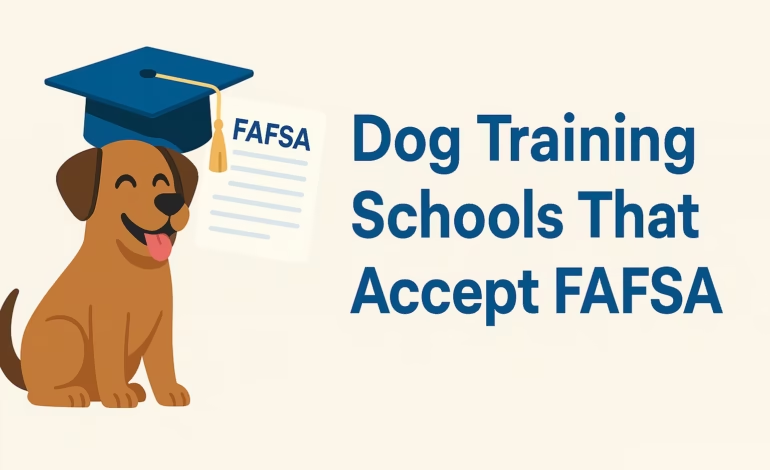
Dog Training Schools That Accept FAFSA
You’re not alone if you’ve ever dreamed of working with dogs daily—teaching them tricks, helping them behave better, and building strong bonds between pets and their owners. Becoming a professional dog trainer is more than just a job; it’s a passion. However, like any career path, getting the proper education can be expensive. Dog Training Schools That Accept FAFSA
That’s where financial aid comes in. Many aspiring trainers don’t realize that some dog training programs are eligible for FAFSA (Free Application for Federal Student Aid). Yes, you read that right—you might be able to get help from the government to follow your dream of working with dogs.
Now, we’ll explore everything you need to know about dog training schools that accept FAFSA, how to apply, and where to find the best programs that support your goals and wallet. Whether you’re just starting or ready to take the next step, this guide is here to help you turn your love for dogs into a lifelong career, without breaking the bank.
What Is FAFSA and How Does It Work?
Money shouldn’t stand in your way when you’re passionate about something, like training dogs. That’s where FAFSA, or the Free Application for Federal Student Aid, comes in. FAFSA is a form the U.S. government provides to help students pay for education, whether it’s college, trade school, or, in some cases, career-focused training programs like dog training.
What Does FAFSA Cover?
FAFSA isn’t just about student loans—it opens the door to several types of financial aid, including:
- Grants – Free money that doesn’t need to be paid back (like the Pell Grant).
- Work-Study Programs – Part-time jobs you can do while studying to help cover expenses.
- Federal Student Loans – Low-interest loans you’ll pay back after school.
You could qualify for one or more of these aid forms depending on your financial situation.
Who Is Eligible for Dog Training Schools That Accept FAFSA?
To qualify for FAFSA, you’ll need to meet a few basic requirements:
- Be a U.S. citizen or eligible non-citizen.
- Have a high school diploma or GED.
- Enroll in an eligible education program.
- Maintain satisfactory academic progress.
- Not be in default on any previous student loans.
Can You Use FAFSA for Dog Training Schools?
Here’s where things get a bit specific. Not all dog training schools accept the FAFSA, especially if privately run or not accredited. However, some community colleges, universities, and specialized institutions offer animal behavior or dog training programs that do qualify for federal financial aid.
These programs may be listed under:
- Animal Science
- Canine Studies
- Veterinary Assistance
- Behavioral Science or Psychology (applied to animals)
The key is ensuring the school and program are accredited and listed in the Department of Education’s database. Once confirmed, you can apply for FAFSA just like you would for a traditional college degree.
Do Dog Training Schools Qualify for FAFSA?
This is one of the most common questions aspiring dog trainers ask—for good reason. Can you use FAFSA to pay for dog training school?
The short answer is: it depends on the school and the program.
Most Private Certification Programs Don’t Qualify
Many dog training schools are privately owned, non-accredited, and focused on short-term certification courses. While these programs can be excellent for hands-on learning, they usually don’t qualify for FAFSA because the government only provides aid to programs that meet specific accreditation and academic standards.
So, suppose you’re looking at a dog training academy that promises a certificate in a few months. In that case, it’s likely not FAFSA-eligible—even if it’s well-known in the dog training community.
Some Accredited Colleges and Institutions Do Accept FAFSA
Here’s the good news: some schools DO accept FAFSA—especially community colleges, universities, or career-focused colleges that offer dog training as part of a broader program.
Look for programs that fall under categories like:
- Animal Behavior or Canine Studies
- Animal Science
- Veterinary Technology
- Behavioral Psychology (with a focus on animals)
If the institution is accredited and the program is officially recognized, FAFSA can help you pay for it, just like any other college degree or vocational training.
Key Requirements for a FAFSA-Eligible Dog Training Program
To qualify for FAFSA, the school and program must meet these criteria:
- A recognized agency accredits the school.
- The program is listed in the Department of Education’s official database.
- It leads to a degree, diploma, or an eligible certificate.
- The program meets a minimum duration requirement (usually more than 15 weeks).
- The institution participates in the Title IV federal student aid program.
Top Dog Training Schools That Accept FAFSA
You’re in luck if you’re serious about becoming a professional dog trainer but need financial help. While not all programs qualify, several accredited schools and colleges do accept FAFSA. Below are some top options combining quality education with financial aid eligibility.
1. Bergin University of Canine Studies (California)
Rohnert Park, California –
Website
Bergin University is one of the only universities worldwide focusing entirely on canine studies. They offer Associate and Bachelor’s degrees in Canine Studies, including hands-on training, service dog education, and behavioral science.
Programs: A.S. and B.S. in Canine Studies
Cost: Around $9,000–$11,000/year
FAFSA Eligible: Yes, fully accredited
Perfect for students who want a career in service dog training or advanced canine behavior work.
2. University of North Texas – Behavior Analysis Program
Denton, Texas –
Website
While this program isn’t solely focused on dogs, the Behavior Analysis program at UNT offers a strong foundation in understanding and shaping behavior, skills highly transferable to dog training, especially for those interested in animal behavior therapy.
Programs: B.A. and M.S. in Behavior Analysis
Cost: Around $11,000–$14,000/year (in-state)
FAFSA Eligible: Yes
Ideal for those looking to combine scientific research with real-world training applications.
3. Moorpark College – Exotic Animal Training and Management Program
Moorpark, California –
Website
This program is one of the most hands-on animal training programs in the U.S. While it covers many species, there is a strong emphasis on canines, and students gain direct training experience.
Programs: Associate Degree in Exotic Animal Training
Cost: Approx. $1,400/year (California residents)
FAFSA Eligible: Yes, public community college
Best for students wanting real-world, hands-on training across species, including dogs.
4. Animal Behavior College (ABC) – Partnered Programs
Based in California, Available Nationwide (Online + Externships) –
Website
ABC is one of the most recognized names in the dog training industry. Most ABC programs do not directly qualify for FAFSA, but they have eligible partner schools. You’ll need to inquire about specific partnerships to use federal aid.
Programs: Certified Dog Trainer (online + externship)
Cost: Around $4,500–$6,000
FAFSA Eligibility: Only through partnered schools
Great for flexible learning, but check carefully for FAFSA-compatible options.
5. Community Colleges with Animal Training or Veterinary Programs
Many community colleges across the U.S. offer Veterinary Assistant or Animal Science programs that include dog behavior and training modules. These colleges are often FAFSA-eligible, affordable, and widely accessible.
Some examples:
- Houston Community College (Texas) – Website
- Programs in Veterinary Assisting
- Portland Community College (Oregon) – Website
- Offers Animal Behavior courses
- College of Southern Nevada (Nevada) – Website
- Offers Veterinary Technician training
Programs: Vary by location (Animal Science, Vet Assisting, etc.)
Cost: Usually under $5,000/year
FAFSA Eligible: Yes (most public colleges)
Best for those looking for an affordable, flexible pathway into dog training careers.
How to Find Dog Training Schools That Accept FAFSA Training Programs?
Finding a dog training program that accepts FAFSA can feel overwhelming, especially with many private academies and short-term courses that don’t qualify. But don’t worry. You can confidently locate a program that trains you well and qualifies for federal financial aid with the proper steps.
Here’s a simple guide to help you find and confirm FAFSA-eligible programs:
 Step 1: Use the Federal School Code Search Tool
Step 1: Use the Federal School Code Search Tool
Go to the official FAFSA website (studentaid.gov) and use the Federal School Code Search tool.
- Enter the name of the state or school you’re interested in.
- Look for schools on the list of participating institutions in the federal student aid program.
If the school isn’t listed, it likely doesn’t accept FAFSA.
 Step 2: Check Accreditation Status
Step 2: Check Accreditation Status
For a program to be FAFSA-eligible, the school must be accredited by a recognized accrediting body. You can:
- Ask the school directly, or
- Look them up on the U.S. Department of Education’s accreditation database.
- Search here: ope.ed.gov/dapip
 Step 3: Review Program Details
Step 3: Review Program Details
Even at accredited schools, not all programs qualify for FAFSA. Make sure the program:
- Is at least 600 clock hours or 15+ weeks long
- Leads to a certificate, diploma, or degree
- Is part of a Title IV-eligible program
It probably won’t be eligible if it’s a standalone short-term course. But you’re likely in the clear if it’s part of a broader animal science, behavioral science, or veterinary technology degree.
 Step 4: Contact the Financial Aid Office
Step 4: Contact the Financial Aid Office
Contact their financial aid office once you’ve found a program you’re interested in. They’ll confirm whether the specific course you’re interested in is FAFSA-eligible and help guide you through the application process.
Don’t hesitate to ask:
- “Is this program eligible for FAFSA?”
- “What’s your federal school code?”
- “What percentage of students receive aid?”
 Step 5: Apply for FAFSA Early
Step 5: Apply for FAFSA Early
The earlier you apply, the better your chances of getting the maximum aid. FAFSA applications open every year on October 1st, and funds are awarded on a first-come, first-served basis.
Apply here: studentaid.gov
Alternatives to FAFSA for Dog Training Programs
Don’t give up if your dream dog training program doesn’t accept FAFSA. Many excellent schools offer alternative ways to help you afford your education. Here are some top options, from private scholarships to payment plans.
 1. Scholarships and Grants from Private Organizations
1. Scholarships and Grants from Private Organizations
Even if a school isn’t FAFSA-eligible, you can still apply for private scholarships or grants. These do not need to be repaid and can significantly reduce out-of-pocket costs.
Look for scholarships related to:
- Animal care
- Canine behavior
- Vocational training
- Women in trades
- First-generation students
Start your search:
- Fastweb
- Scholarships.com
- Pet industry foundations (like AKC, Petfinder Foundation)
Tip: Some dog training schools may also have their scholarship programs. Always ask!
 2. GI Bill (for Veterans)
2. GI Bill (for Veterans)
If you’re a military veteran or dependent, the GI Bill could cover part or all of your dog training tuition—if the VA approves the program.
- Some dog training schools, especially those that work with service animals, accept GI Bill benefits.
- Use the VA’s WEAMS Institution Search to find eligible programs:
- inquiry.vba.va.gov/weamspub
Veterans may also qualify for housing allowances while attending training full-time.
 3. Employer-Sponsored Education or Tuition Reimbursement
3. Employer-Sponsored Education or Tuition Reimbursement
If you’re already working in a pet-related field—like veterinary clinics, dog daycares, shelters, or pet stores—ask your employer if they offer:
- Education stipends
- Tuition reimbursement
- Paid training programs
- Certification bonuses
Many employers are open to supporting education if it improves your skills and benefits the business.
 4. Private Financing or School Payment Plans
4. Private Financing or School Payment Plans
Many dog training schools offer in-house payment plans or partner with private financing companies.
- Spread tuition over monthly payments with no or low interest.
- Some schools allow you to start training with a small deposit.
- Others offer “pay as you go” options for different modules or levels.
Popular financing partners include:
- Climb Credit
- Meritize
- PayPal Credit
Always read the terms carefully before signing a financing agreement.
Is It Worth It? The ROI of a Dog Training Career
If you’re passionate about working with dogs, you probably wonder, “Can I make a living from this?” The answer is yes—with the proper training and dedication, a career in dog training can be both emotionally fulfilling and financially stable.
 Average Income of a Dog Trainer
Average Income of a Dog Trainer
According to the U.S. Bureau of Labor Statistics and industry surveys, professional dog trainers in the U.S. earn between $30,000 and $60,000 per year.
Experienced trainers, those with specialties (e.g., service dogs, aggression rehab), or who run their businesses can earn $75,000+ annually.
Income can be even higher in large metro areas or through private contracts.
 Job Demand and Growth Outlook
Job Demand and Growth Outlook
Pet ownership is rising, with over 65 million U.S. households owning dogs.
More people are seeking professional help with training due to busy lifestyles, behavioral issues, and an increasing focus on pet wellness.
The dog training industry is projected to grow steadily in the coming years, especially in urban and suburban areas.
 How Education Boosts Credibility and Earnings
How Education Boosts Credibility and Earnings
While it’s possible to become a dog trainer through self-teaching or apprenticeships, formal education offers key advantages:
Enhances your credibility with clients and employers.
Helps you command higher rates and access specialized roles (e.g., service dog training, therapy work, scent detection).
Opens doors to certifications and professional networks.
A structured, FAFSA-eligible program can be your stepping stone to a long-term, respected career in canine behavior and training.
Your Path to a Career with Dogs Starts Here
Dog training isn’t just a job—it’s a deeply rewarding calling. And thanks to options like FAFSA, the cost of getting a solid education doesn’t have to be a roadblock.
From accredited universities like Bergin University to specialized programs at community colleges, there are real opportunities to pursue your passion with the help of financial aid.
When choosing your school, consider:
- FAFSA eligibility
- Accreditation
- Career outcomes
And remember—no matter where you’re starting from, the first step toward becoming a professional dog trainer is to believe in yourself and take action.
The dogs are waiting. Let’s help them live better lives—starting with your training.
FAQs About FAFSA and Dog Training Programs
Only if an accredited school that participates in Title IV federal aid offers the online program, always verify with the institution before enrolling.
Some platforms offer free introductory courses, but typically don’t carry professional weight. Recognized certifications usually require paid training and are often provided by:
International Association of Canine Professionals (IACP)
Certification Council for Professional Dog Trainers (CCPDT)
A certificate is a shorter, career-focused program (can take a few months).
A degree (like an A.S. or B.S. in animal behavior) takes 2–4 years and includes broader academic training.
Degrees tend to offer more career flexibility and long-term earning potential.
FAFSA-eligible programs typically last:
Certificate programs: 6 months to 1 year
Associate degrees: 2 years
Bachelor’s degrees: 4 years
Always check with the school to know the duration of your chosen path.



